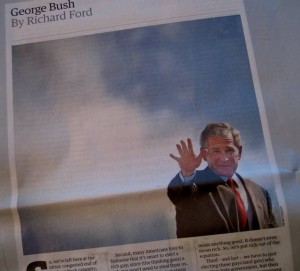From Reuters.
HARARE, Jan 16 – Zimbabwe’s central bank will introduce a 100 trillion Zimbabwe dollar banknote, worth about $33 on the black market, to try to ease desperate cash shortages, state-run media said on Friday.
Prices are doubling every day and food and fuel are in short supply. A cholera epidemic has killed more than 2,000 people and a deadlock between President Robert Mugabe and the opposition has put hopes of ending the crisis on hold.
Hyper-inflation has forced the central bank to continue to release new banknotes which quickly become almost worthless.
There is an official exchange rate, but most Zimbabweans resort to the informal market for currency transactions.
In addition to the Z$100 trillion dollar note, the Reserve Bank of Zimbabwe plans to launch Z$10 trillion, Z$20 trillion and Z$50 trillion notes, the Herald newspaper reported.
Every time I think that things can’t get any worse under Mugabe, they do.





